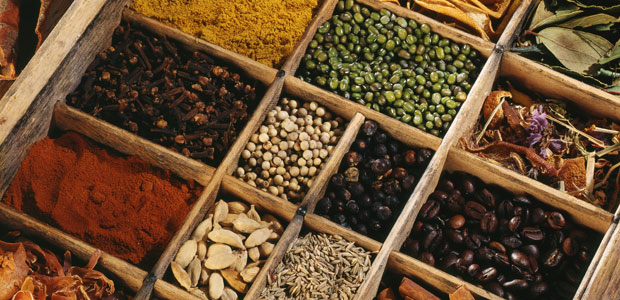Advertisement
Spice It Up!
Today researchers continue to uncover evidence to confirm the disease-fighting and health-promoting abilities of many spices. Packed full of nutrients and antioxidants, the following 10 spices are just as good for you as they taste. CinnamonA traditional holiday spice, cinnamon is not only a yummy addition to hot apple cider, but may also be an … Continued

Today researchers continue to uncover evidence to confirm the disease-fighting and health-promoting abilities of many spices. Packed full of nutrients and antioxidants, the following 10 spices are just as good for you as they taste.
Cinnamon
A traditional holiday spice, cinnamon is not only a yummy addition to hot apple cider, but may also be an effective defense against metabolic syndrome, cardiovascular disease, and diabetes.
Garlic
Garlic’s disease-fighting qualities appear to come from the sulfur compounds that are responsible for its pungent smell. Studies have found that these sulphur compounds, allicin in particular, may prevent a wide range of illnesses including heart disease, cancer, and even the common cold.
Ginger
Used for over 2,000 years in Chinese medicine to treat nausea, scientists are discovering that ginger may have pain-relieving qualities as well. Although results are mixed, the anti-inflammatory properties of ginger may also be beneficial in treating arthritis.
Turmeric
This yellow spice that gives Indian food its distinctive flavour is proving to be a health superstar due to curcumin, the powerful polyphenol it contains. Preliminary studies suggest curcumin may be useful in reducing inflammation, increasing cognitive function, and preventing cancer and diabetes.
Oregano
Preliminary evidence suggests oregano may be able to induce death in cancer cells. Researchers also believe oregano’s anti-inflammatory effect may be useful in treating osteoporosis, arteriosclerosis, and Crohn’s disease.
Rosemary
Rosemary is a good source of free radical-fighting vitamin A, immune-boosting vitamin C, and bone-building calcium.
Cloves
A good source of vitamins C and E, dietary fibre, calcium, and iron, cloves are not only nutrient dense but also antioxidant rich. One antioxidant found in cloves, eugenol, has been shown in numerous studies to control pain and inflammation and to have antibacterial effects.
Cayenne pepper
Cayenne pepper contains a high concentration of the health-promoting compound capsaicin, which appears to inhibit the body from sending pain messages to the brain when applied topically. Researchers have also found this heat-producing chemical may be a useful weight loss aid.
Saffron
Traditionally used in Persian medicine to elevate mood, research out of Iran suggests this popular Asian spice may be just as effective as the drug fluoxetine in treating mild to moderate depression.
Sage
Scientists from Northumbria University found that when healthy young adults were given either a 25 or 50 mcL dose of sage essential oil, the participants performed better on memory tests and also reported an increased sense of calm and happiness.
Evidence is also emerging to suggest that the brain-boosting power of sage may provide protection against Alzheimer’s disease as well.
Related Articles





